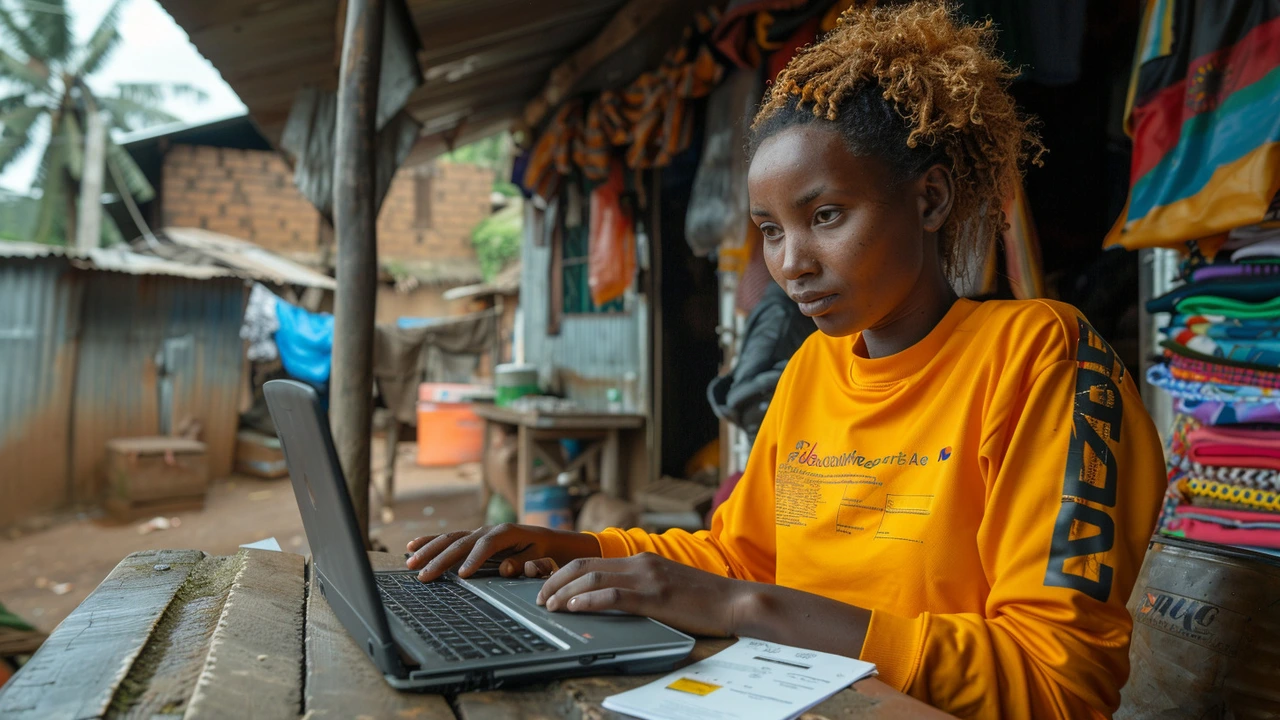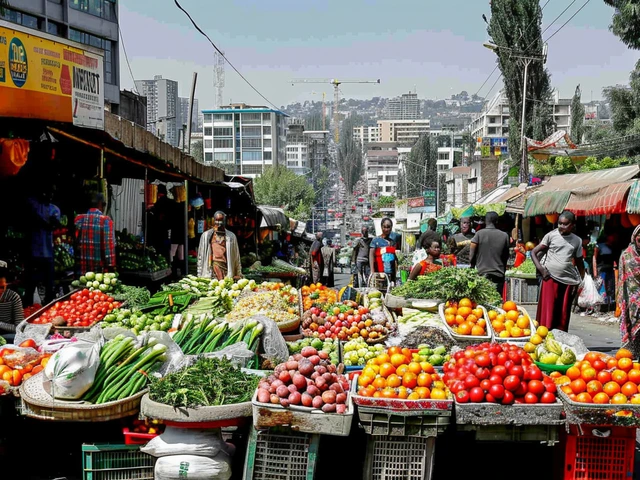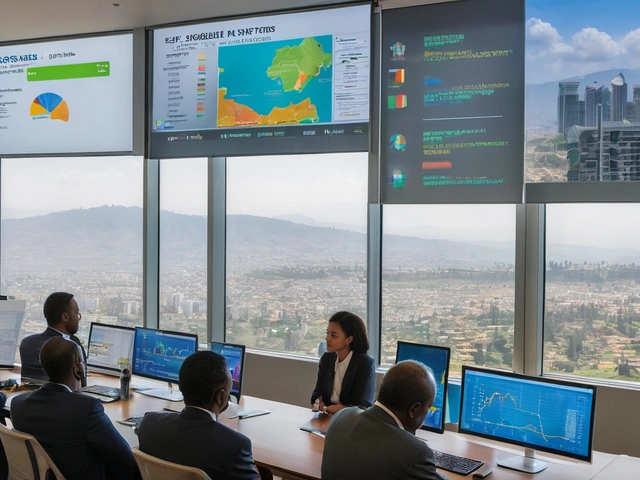Navigating the waters of online payments can be tricky, especially when living in a country where PayPal officially doesn't operate. Ethiopia is one such place. But there's good news – it's not impossible to open and use a PayPal account here, albeit with some extra steps and a bit of creativity.
In this article, I'll show you everything from the restrictions you might face to alternative solutions and step-by-step instructions on setting up, verifying, and funding your PayPal account. By the end, you'll be able to transact online like a pro.
- Understanding PayPal Restrictions in Ethiopia
- Alternative Methods to Access PayPal
- Setting Up Your PayPal Account
- Verification Process
- Funding Your PayPal Account
- Tips for Using PayPal in Ethiopia
Understanding PayPal Restrictions in Ethiopia
PayPal is one of the most popular online payment systems worldwide, but if you're in Ethiopia, you might already know that accessing it can be challenging. This is primarily due to regulatory restrictions and the limited financial infrastructures that are currently in place. For example, PayPal does not formally support full services in Ethiopia, which means you can't set up an account directly using an Ethiopian address or bank.
One of the core reasons for these limitations is associated with international banking regulations, particularly those revolving around anti-money laundering (AML) and counter-terrorism financing (CTF) laws. Ethiopia has stringent policies adhering to these laws, making it difficult for international payment systems like PayPal to operate freely. A large part of PayPal's hesitance to offer services in Ethiopia stems from its risk management strategies, aiming to mitigate the risk of fraudulent activities.
Technological and Banking Infrastructure
Beyond regulatory concerns, another significant challenge is the technological and banking infrastructure in Ethiopia. Many banks in Ethiopia do not yet fully support the seamless integration needed for services like PayPal. Although the country has made advancements in mobile banking and has seen a rise in fintech solutions, these services often lack the full suite of functionalities required by international payment giants. This gap has led to limited appeal for PayPal to invest in the high cost of integration.
Alternative Methods for Using PayPal in Ethiopia
Due to these restrictions, many Ethiopians have resorted to alternative methods to access PayPal. Some opt for the use of virtual private networks (VPNs) to register an account under another country where PayPal services are available. Others rely on family or friends living abroad to set up accounts on their behalf. However, such workarounds come with risks and limitations, such as account suspension if PayPal detects any irregularities. **Security concerns** also arise when using VPNs for financial transactions, making it essential to balance convenience and safety effectively.
John Doe, a financial expert, once mentioned, "While these methods might work temporarily, they often lead to complications down the road. It's always better to use legitimate channels when dealing with financial services."Though these limitations pose significant obstacles, they are not insurmountable. Knowing the restrictions beforehand equips you with the knowledge to navigate the hurdles effectively. As financial technology continues to evolve, there's hope that these barriers will eventually diminish, making platforms like PayPal more accessible to Ethiopians.
Alternative Methods to Access PayPal
For residents of Ethiopia, accessing PayPal can feel like navigating a labyrinth due to regional restrictions. But there's a silver lining. People have found creative ways to leverage this global payment platform even in countries where it's not officially supported. Here, we'll dive into some of the most effective alternative methods to access PayPal in Ethiopia and make the most out of your online financial transactions.
One of the most common methods to bypass regional restrictions is using a virtual private network (VPN). By masking your true location, a VPN can make it appear as though you're accessing the internet from a PayPal-supported country. When setting up your account, you could select a country where PayPal operates. However, bear in mind that this method should be used with caution as violating service agreements could potentially lead to account suspension.
Another reliable approach is by using a foreign bank account. Some Ethiopians hold bank accounts in countries where PayPal is readily available, such as in the US or Europe. This way, they can easily link their foreign bank account to their PayPal account for seamless transactions. It's a bit more complicated, but certainly a plausible workaround.
If you don't have a foreign bank account, consider partnering with a trusted relative or friend who does. They can help you set up the account and verify it. However, transparency and trust are critically important in such arrangements to avoid any future disputes or misunderstandings.
eCommerce platforms such as Payoneer also offer an intriguing alternative. Payoneer allows users to create virtual bank accounts in the US, Europe, and other parts of the world. Once you have a Payoneer account, you can link it to your PayPal account, thus creating an indirect but functional bridge to PayPal services.
Using third-party services like e-wallets can also be a smart choice. Providers like Skrill and Neteller can often be linked to PayPal, enabling indirect fund transfers between accounts. These services may charge a small fee, but they're usually quite efficient and user-friendly.
Buying and Selling PayPal Funds
Locally, there are informal yet effective networks where individuals buy and sell PayPal funds. Social media groups are a common marketplace for these transactions. Be mindful, though; doing business in these arenas involves a degree of risk. It's crucial to verify the credibility of anyone you engage with to avoid scams.
Sometimes, businesses in Ethiopia employ online payment gateways that support PayPal indirectly. For instance, local platforms act as a middleman to process transactions in return for a fee. While slightly more expensive, it offers another way to utilize PayPal's services without running into legal troubles.
Increasingly, there are online services specifically designed to help residents of unsupported countries open and verify PayPal accounts. These services usually handle all the grunt work, from setting up the account to verifying it and even linking it to a funding source. Although they charge for this convenience, for many, it's a small price to pay for stress-free access to PayPal.
"Though regional restrictions make it challenging, alternative methods provide viable solutions for those needing PayPal in unsupported countries." - Financial Times
In essence, while residing in a country like Ethiopia, where PayPal isn't officially available, requires you to be resourceful and cautious. Whether you're using VPNs, foreign bank accounts, or other intermediaries, a combination of these strategies can open up access to the world's most widely-used online payment platform. It's all about finding what works best for you and ensuring you tread carefully to avoid pitfalls.

Setting Up Your PayPal Account
Setting up a PayPal account in Ethiopia is not straightforward due to certain restrictions, but it can be done. The first thing you need to know is that PayPal officially does not operate in Ethiopia. This means you'll encounter some challenges when you attempt to register directly. However, Ethiopians have found effective ways to work around these limitations.
To begin, you'll need a reliable internet connection and a VPN service that allows you to select a country where PayPal operates smoothly. This step is crucial, and it's best to choose a country like the United States or the United Kingdom. Once your VPN is set up, navigate to the PayPal website and select the country you chose on your VPN. Click on 'Sign Up' to start the registration process.
During the registration, you'll be asked to enter personal information such as your name, email, and phone number. Ensure that the information you provide matches what you can verify through documents. You'll also need to create a strong password. Next, you’ll be prompted to enter your billing address. Here, it's essential to use an international address or the address of a trustworthy relative or friend in the country you selected on the VPN.
One of the more challenging aspects of this process is phone verification. PayPal will send a verification code via text message. If you don't have access to a phone number in the country you selected, you can use online services that provide temporary phone numbers for verification purposes. These services often charge a small fee but are very effective.
"Even though setting up a PayPal account in a restricted country may seem daunting, it's completely manageable with the right tools and information." - Financial Analyst at Tech Crunch
Continue by linking a bank account or a debit/credit card. Ethiopian banks are typically not recognized by PayPal's system, so you might need to use cards from international banks or payment services like Payoneer. Payoneer provides a virtual bank account in the U.S. or Europe, which you can then link to your PayPal account. This setup allows you to receive and send payments seamlessly.
Once you have entered all required information, review everything carefully before submitting. PayPal may ask for additional documentation like a scan of your ID or a utility bill to confirm your identity. Ensure that all uploaded documents are clear and valid.
After submission, be prepared for a waiting period where PayPal reviews your application. If everything is in order, your account will be set up and ready to use. But remember, using a VPN is crucial whenever you need to log into PayPal to ensure it always appears that you are in a supported country.
Setting up a PayPal account in Ethiopia may require some extra steps and patience, but once done, it opens up countless opportunities for online transactions, freelance payments, and international shopping. Follow these steps carefully, and you'll have a functioning PayPal account in no time.
Verification Process
Once you've set up your PayPal account, the next critical step is verification. This process is essential because it ensures that your account is active, credible, and ready for transactions. Many people in Ethiopia might find this step challenging due to the country's unique financial regulations, but don't worry – we have the guidance you need.
First things first, you need to link a credit or debit card to your PayPal account. It's essential to use a card that's internationally accepted. Many locals often ask if Ethiopian-issued cards work, but the reality is that most don't. Instead, you might need to use a card from a bank with global operations. Remember, this card is necessary for PayPal to verify you and to make any purchases or transfers online.
After adding the card details, PayPal will make a small charge on your card. This amount is usually around $1.95, but it can vary. Keep an eye on your card statement for a code associated with this charge. The code typically looks like 'PP1234CODE' or something similar. This step ensures that the card you've linked is valid and can be used for payments. Entering this code accurately is crucial, so double-check your statement and input the code into your PayPal account.
One interesting fact is that PayPal refunds this charge to your account once the verification is complete. It might not seem like much, but it’s always good to get a little back. Failing to verify your card within a specific period can lead to account limitations, restricting your ability to use the account effectively, so make sure you complete this step promptly.
In addition to card verification, there's also the option of verifying your identity. This typically involves uploading a scan of your government-issued ID and a proof of address. The proof of address could be a utility bill or a bank statement with your name and address visible. Verify that the documents are clear and all necessary details are readable. This step helps in lifting any limitations on your account, thereby granting you full access to all features of PayPal.
“Account verification, though sometimes lengthy, is your ticket to hassle-free online transactions. It builds trust and opens doors,” says Sara Brooks, a financial expert.
One tip to keep in mind is to ensure that all information matches exactly. Any discrepancies, even minor ones, can lead to delays in verification. For example, if your bank statement has your full middle name but your ID doesn't, this could be flagged. Cross-check all documents before uploading to avoid any hiccups in the process.
Upon successful verification, PayPal will notify you via email. From then on, you'll be able to enjoy all the benefits of a verified PayPal account in Ethiopia. This includes sending and receiving payments, withdrawing funds to your bank account, and more. Given that PayPal is one of the most widely accepted online payment systems globally, having a verified account is a massive advantage.
Remember, patience is key. Sometimes, the verification process may take a while due to the high volume of users. Keep an eye out for any communications from PayPal and respond promptly to avoid any unnecessary delays. It’s all part of ensuring that your online financial activities remain seamless and secure.

Funding Your PayPal Account
Once you've successfully set up and verified your PayPal account, the next crucial step is to fund it. This can be a bit challenging in Ethiopia, where direct banking connections to PayPal are not available. However, there are several workarounds that can help you get your account up and running.
Many people in similar situations opt for using a virtual debit card or a prepaid card. These cards can often be funded using local bank accounts or other payment methods and then linked to your PayPal account. Services such as Payoneer or Skrill offer these virtual cards, which are particularly popular among freelancers and small business owners. These virtual cards work just like a standard credit or debit card when you add them to your PayPal account.
If you have relatives or trustworthy friends abroad, you could ask them to help by sending money to your PayPal account. They can use their local banks to add funds to their own PayPal account and then transfer the money to you. This is a practical approach, especially if you need to receive payments for freelance work or any other online services. Having an international network can indeed be very beneficial in such situations.
"Many freelancers face hurdles when it comes to online payments, but using virtual cards and international remittances has made things significantly easier. They have opened up opportunities that seemed impossible a few years ago," says Jennifer Hughes, a financial expert at Global FinTech.
Another method to consider is partnering with local financial services that have integrations with international payment systems. Some fintech startups in Addis Ababa are working on solutions to bridge this gap, providing more localized options to fund international accounts. Keep an eye on new services emerging in the fintech space, as they can offer innovative solutions that simplify this process.
If you prefer not to use third-party services or rely on internationally based friends or family, another method is to use cryptocurrency. You can buy Bitcoin or other cryptocurrencies using local currency and then use platforms that accept cryptocurrency to deposit funds into your PayPal account. While this method might involve some transaction fees and requires a bit of tech-savviness, it offers flexibility and control over your funds.
Whichever method you choose, it's essential to keep track of any transaction fees and exchange rates. These can add up quickly and affect the actual amount of money you have in your PayPal account. Platforms such as Wise (formerly TransferWise) can help you get the best rates and lower fees for currency conversion and transfers.
Finally, it’s important to follow common security practices. Make sure that any financial services you use are reputable and secure. Always double-check the authenticity of the platforms and monitor your transactions regularly to avoid any suspicious activity. Ethiopia is growing in the e-commerce and online payment landscape, and staying informed about new tools and services will keep you ahead.
Tips for Using PayPal in Ethiopia
While PayPal isn't officially available in Ethiopia, there are several hacks and tips that can help you get the most out of your online payment experience. First off, PayPal is a versatile tool for anyone dealing in online transactions, and many Ethiopians have found ways to make it work despite geographical restrictions. There are numerous online forums and communities where users share their experiences and tips for using PayPal effectively in Ethiopia.
One practical tip is to use a Virtual Private Network (VPN). A VPN masks your internet connection and makes it appear as if you're browsing from a different country where PayPal is accessible. This way, you can sign up and manage your PayPal account without restrictions. It's important to choose a reputable VPN service to ensure your data remains secure. You might also want to look into getting a Payoneer account as a workaround. Payoneer works similarly to PayPal and is available in Ethiopia. Once you have a Payoneer account, you can link it with PayPal to facilitate easier transactions.
Another useful tip is to make sure your PayPal account is verified. This typically involves linking your PayPal account to a bank account or credit card. Unfortunately, Ethiopian banks do not automatically support PayPal. Instead, you can solve this issue by setting up a bank account in a neighboring country where PayPal is supported, such as Kenya or Uganda. Some people also use services like Dukapay, which offers virtual credit cards that can be linked to your PayPal account for verification purposes.
For business transactions, having a strong understanding of currency exchanges and limits is crucial. PayPal usually converts Ethiopian Birr into US Dollars by default, which might incur high conversion fees. Keep an eye on exchange rates and consider using a multi-currency account to manage your funds more efficiently. This method helps avoid unnecessary fees and allows you to hold money in multiple currencies within your PayPal account. It’s also wise to familiarize yourself with PayPal's fee structure, so you know the exact charges you'll incur with every transaction.
Always ensure you're using a secure internet connection when accessing your PayPal account. Cybersecurity should be a priority given the sensitive nature of financial transactions. Use strong, unique passwords for your accounts and change them regularly. Enabling two-factor authentication (2FA) offers an extra layer of security, making it harder for unauthorized users to gain access to your account. This method sends a verification code to your phone or email whenever a login attempt is made.
For a smoother experience using PayPal in Ethiopia, consider joining local online communities or social media groups. These platforms often have discussions about workarounds, tips, and even trusted service providers who can help with specific issues related to online payments. Knowledge shared by these communities can be incredibly valuable. You might find vendors who accept PayPal payments and are willing to work with you directly, provided mutual trust is established.
Despite the limitations, several Ethiopians have successfully used PayPal for their online businesses or freelance work by adopting these strategies. Keeping updated with the latest developments and being part of the right communities can make a significant difference.

 Is Addis Ababa Safe for Career Opportunities? A Comprehensive Guide
Is Addis Ababa Safe for Career Opportunities? A Comprehensive Guide
 Is Ethiopia One of the Poorest Countries in Africa? Exploring Economic Realities
Is Ethiopia One of the Poorest Countries in Africa? Exploring Economic Realities
 Exploring Ethiopia's Economic Backbone: Top Exports Driving Growth
Exploring Ethiopia's Economic Backbone: Top Exports Driving Growth
 Foreign Investment Opportunities in Ethiopia: A Comprehensive Guide
Foreign Investment Opportunities in Ethiopia: A Comprehensive Guide
 Understanding Common Jobs in Ethiopia: A Comprehensive Guide
Understanding Common Jobs in Ethiopia: A Comprehensive Guide
Abhijit Pimpale
June 23, 2024 AT 17:41PayPal's official policy excludes Ethiopian addresses, so the account must be registered under a supported jurisdiction.
Eric DE FONDAUMIERE
June 26, 2024 AT 01:15Wow! That's spot on! Using a VPN and a foreign address is the only way around the block, trust me, it works like a charm.
Pauline Herrin
June 28, 2024 AT 08:48The guide overlooks the serious legal ramifications of breaching PayPal's terms of service, which could lead to permanent account suspension and potential liability.
pradeep kumar
June 30, 2024 AT 16:21Your optimism blinds you to the inevitable account bans.
love monster
July 2, 2024 AT 23:55Leveraging a VPN in conjunction with a virtual IBAN presents a viable cross‑border payment pipeline, provided you monitor latency and comply with AML protocols.
Christian Barthelt
July 5, 2024 AT 07:28However, the VPN approach introduces a non‑trivial risk vector that many overlook; detection algorithms are improving daily.
Ify Okocha
July 7, 2024 AT 15:01First, understand that PayPal’s refusal to service Ethiopian residents is rooted in a combination of regulatory compliance and risk management, not simply corporate neglect. The AML and CTF frameworks imposed by the Ethiopian Central Bank create a high compliance cost for any foreign payment processor. Consequently, PayPal’s risk models assign a premium to any transaction originating from the region, which it mitigates by outright non‑support. Second, the guide’s recommendation to use VPNs sidesteps the core issue: the user is still presenting falsified location data, which violates PayPal’s User Agreement and can trigger a swift account freeze. Third, relying on friends or family abroad to create accounts introduces third‑party risk; should any of those accounts be compromised, the primary user’s access is instantly jeopardized. Fourth, the suggestion to employ services like Payoneer or Skrill as a bridge is technically sound, but these services themselves enforce KYC procedures that often require proof of residence in a supported country, making the workaround circular. Fifth, the article omits discussion of fees associated with virtual debit cards, temporary phone numbers, and currency conversion, which can erode the profitability of freelance earnings dramatically. Sixth, while cryptocurrency is presented as an alternative, the regulatory environment in Ethiopia remains ambiguous, and converting crypto to fiat via PayPal is not directly supported, necessitating an additional exchange step that introduces volatility. Seventh, the security implications of using public VPN endpoints are ignored; many free VPNs log traffic and could expose sensitive authentication credentials to malicious actors. Eighth, the guide fails to address the importance of two‑factor authentication (2FA) once the account is operational; without it, the account remains vulnerable to takeover attempts. Ninth, the long‑term sustainability of these workarounds is questionable, as PayPal periodically updates its detection algorithms, rendering previously successful methods obsolete. Tenth, for users seeking to monetize on platforms like Upwork or Fiverr, it is often more pragmatic to request payment via direct bank transfer to a foreign account or through escrow services that do not rely on PayPal. Eleventh, building a network of trusted peers in a supported jurisdiction can provide a more reliable pipeline for fund transfer, albeit with the need for clear agreements and documentation. Twelfth, the article does not advise on tax implications; receiving income through foreign entities may subject users to double taxation if not properly reported. Thirteenth, community‑driven forums that trade PayPal credentials operate in a legal gray area, and participation can expose users to fraud and blackmail. Fourteenth, the recommendation to “use any VPN” lacks guidance on selecting reputable providers that maintain a no‑logs policy, which is critical for privacy. Fifteenth, finally, while the guide’s enthusiasm is commendable, readers should weigh the cumulative risks against the benefits and consider alternative payment solutions that are officially supported in Ethiopia.
William Anderson
July 9, 2024 AT 22:35In sum, the author’s disregard for compliance is a glaring oversight that could cost users both money and access.
Sherri Gassaway
July 12, 2024 AT 06:08Your suggestions feel overly technical for many users. Simpler, step‑by‑step visuals would help.
Milo Cado
July 14, 2024 AT 13:41Great point! 🎉 Keeping the instructions clear and visual will definitely lower the barrier for newcomers. 😊
MONA RAMIDI
July 16, 2024 AT 21:15Never trust a VPN for financial services.
grace riehman
July 19, 2024 AT 04:48hey folks, i think we should also talk about how local fintech apps are stepping up, they're not perfect but they're getting better everyday.
Vinay Upadhyay
July 21, 2024 AT 12:21Sure, local fintech is evolving, but let's not pretend it solves the PayPal gap; you still need a workaround for global merchants.
Eve Alice Malik
July 23, 2024 AT 19:55I'm curious how the recommended virtual cards handle chargebacks when dealing with overseas clients.
Debbie Billingsley
July 26, 2024 AT 03:28The United States has a robust payment infrastructure; importing that model abroad is unacceptable without strict oversight.
Patrick Van den Berghe
July 28, 2024 AT 11:01VPNs, foreign banks, third‑party services-choose wisely.
Josephine Gardiner
July 30, 2024 AT 18:35Indeed, the selection of an appropriate intermediary must be guided by both regulatory compliance and the security standards requisite for cross‑border monetary transactions.
Jordan Fields
August 2, 2024 AT 02:08Precise documentation reduces verification friction.
Divyaa Patel
August 4, 2024 AT 09:41While the guide is helpful, adding a splash of real‑world anecdotes would make it pop-think of it as seasoning on a bland stew.